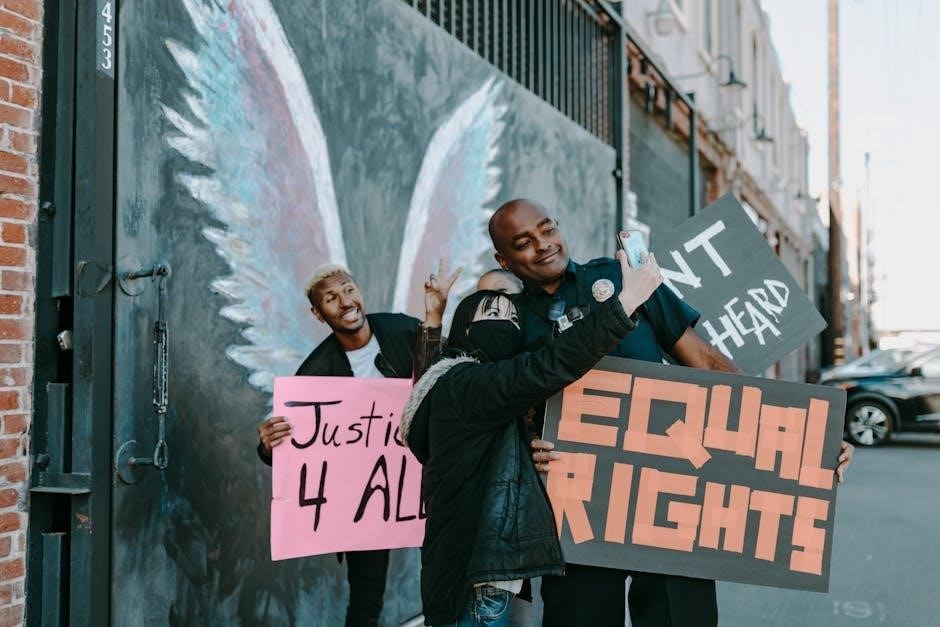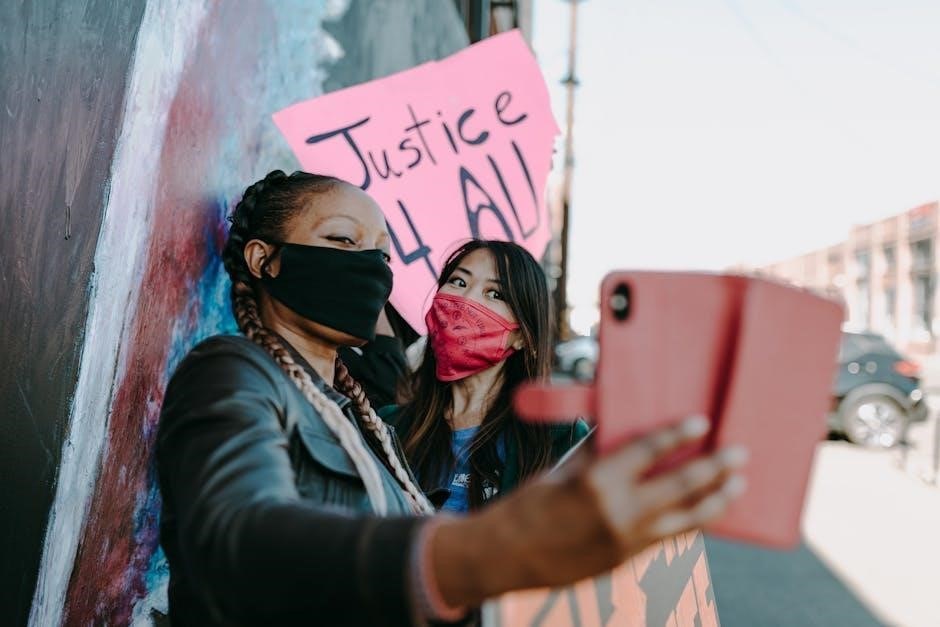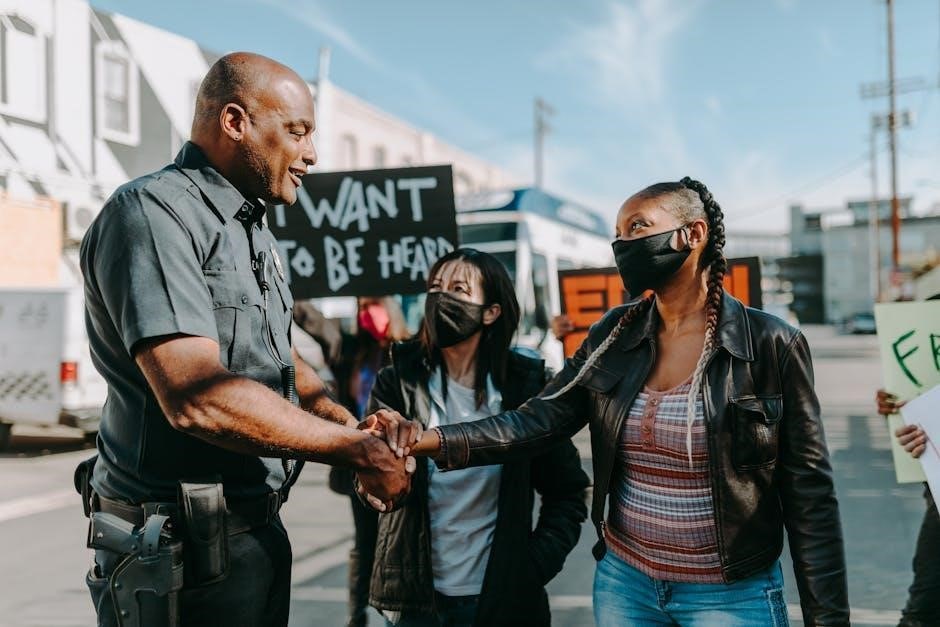Diversity and social justice readings offer transformative insights into societal inequities, fostering empathy and understanding․ Free PDF resources provide accessible education, empowering individuals to challenge biases and promote inclusivity, creating a more just society․
Overview of the Importance of Diversity and Social Justice Literature
Diversity and social justice literature plays a vital role in addressing systemic inequities and promoting inclusivity․ These readings provide a platform for marginalized voices, offering insights into the experiences of individuals impacted by racism, sexism, and other forms of oppression․ By exploring these narratives, readers gain a deeper understanding of the historical and contemporary struggles faced by diverse groups․ This literature fosters empathy, challenges stereotypes, and encourages critical thinking about power dynamics and societal structures․ It also serves as a tool for education, equipping individuals with the knowledge to advocate for change․ The availability of free PDF resources ensures that these important works are accessible to a broader audience, amplifying their impact and contributing to a more equitable society․
Role of Reading in Fostering Empathy and Understanding
Reading plays a transformative role in fostering empathy and understanding by allowing individuals to engage with diverse perspectives and experiences․ Through narratives that highlight the struggles and triumphs of marginalized groups, readers can step outside their own experiences and gain insight into the lives of others․ This empathetic engagement helps dismantle prejudice and stereotypes, fostering a deeper connection to the broader human experience․ Free PDF resources on diversity and social justice make these narratives accessible, ensuring that everyone can participate in this transformative process․ By immersing oneself in these stories, readers develop a more nuanced understanding of societal inequities and are inspired to advocate for change․ Reading, therefore, becomes not just an educational tool but a powerful catalyst for personal and societal growth․

Key Themes in Readings for Diversity and Social Justice
Diversity and social justice readings explore themes like racism, sexism, and intersectionality, shedding light on systemic inequities․ Free PDF resources offer accessible insights into these critical societal issues, fostering awareness and dialogue․
Racism and Its Impact on Society
Racism remains a deeply ingrained issue, perpetuating inequality and systemic oppression․ Readings on diversity and social justice, such as Readings for Diversity and Social Justice, explore its historical roots and modern manifestations․ These texts reveal how racism affects individuals and communities, limiting opportunities and fostering division․ By examining personal narratives and theoretical analyses, readers gain a deeper understanding of racism’s pervasive impact․ Free PDF resources like these provide accessible tools for education and reflection, encouraging dialogue and action․ They highlight the importance of dismantling racial biases and advocating for equitable systems․ Through these readings, individuals can engage with diverse perspectives, fostering empathy and promoting collective efforts to combat racism and its societal consequences․
Sexism and Gender-Based Oppression
Sexism and gender-based oppression are pervasive issues that shape societal structures and individual experiences․ Readings for Diversity and Social Justice delve into the historical and contemporary manifestations of sexism, exploring its intersection with race, class, and other identities․ These texts examine how gender-based oppression limits opportunities, perpetuates stereotypes, and reinforces systemic inequality․ By sharing personal narratives and theoretical frameworks, the readings provide insight into the ways sexism impacts both personal and collective lives․ Free PDF resources offer accessible ways to engage with these critical issues, fostering awareness and encouraging advocacy for gender equity․ They emphasize the importance of challenging patriarchal norms and promoting inclusive environments where diverse gender identities and expressions are valued and respected․ Through these readings, individuals can gain a deeper understanding of the fight for gender justice and its significance in building an equitable society․
Intersectionality and Multiple Identities
Intersectionality examines how overlapping social identities, such as race, gender, class, and sexuality, create unique experiences of oppression and privilege․ Readings for Diversity and Social Justice highlight these complexities, emphasizing that individuals cannot be defined by a single identity․ Works by scholars like Kimberlé Crenshaw and Gloria Anzaldua explore how systemic injustices intersect, shaping lived experiences․ These texts challenge readers to recognize and address the compounded effects of discrimination․ Free PDF resources provide accessible insights into intersectional frameworks, enabling deeper understanding of marginalized voices․ By engaging with these readings, individuals can better advocate for equity and inclusivity, acknowledging the diversity of human experiences․ This perspective is essential for fostering a society that values and supports all identities equally, promoting social justice on multiple levels․

Notable Contributors to Diversity and Social Justice Literature
Cornel West, Audre Lorde, and Gloria Anzaldua are pivotal voices in diversity and social justice literature․ Their works, available as free PDF resources, deeply explore identity, oppression, and empowerment, reshaping societal understanding and advocacy․
Cornel West: Contributions to Social Justice Discourse
Cornel West is a renowned philosopher, scholar, and social activist whose work has profoundly shaped discussions on race, class, and justice․ His writings, often featured in diversity and social justice readings, emphasize the interconnectedness of systemic oppressions and the need for collective action․ West’s essays, such as those in Readings for Diversity and Social Justice, explore themes of democracy, equality, and the struggles of marginalized communities; His ability to bridge academic theory with grassroots activism has made his contributions accessible and impactful․ Through his work, West challenges readers to critically examine power structures and advocate for a more equitable society․ His influence extends across education, politics, and cultural movements, making him a pivotal figure in contemporary social justice discourse․
Audre Lorde: Perspectives on Identity and Oppression
Audre Lorde, a celebrated African-American poet and activist, offers profound insights into identity, oppression, and intersectionality․ Her writings, featured in Readings for Diversity and Social Justice, explore the interplay of race, gender, sexuality, and class․ Lorde’s work challenges systemic inequalities and advocates for the empowerment of marginalized voices․ Her essays, such as those in Sister Outsider, emphasize the importance of acknowledging and embracing multiple identities․ Lorde’s perspective highlights the transformative power of self-definition and solidarity․ Her contributions remain essential in fostering dialogue and understanding, making her a cornerstone of social justice literature․ Through her words, Lorde inspires readers to confront oppression and strive for a more inclusive world, ensuring her legacy endures as a vital voice for justice and equality․
Gloria Anzaldua: Insights on Intersectional Experiences
Gloria Anzaldua, a groundbreaking Chicana feminist writer, provides profound insights into intersectional experiences through her works․ Her seminal book, Borderlands/La Frontera, explores the complexities of identity, race, gender, and culture, particularly for Chicana women․ Anzaldua’s writing bridges personal narratives with broader social justice themes, emphasizing the importance of acknowledging and embracing multiple identities․ Her concept of the “mestiza consciousness” highlights the transformative power of navigating and reconciling different cultural and social realities․ Free PDF versions of her essays and chapters from Readings for Diversity and Social Justice are widely available, making her critical perspectives accessible to a broader audience․ Anzaldua’s work remains essential for understanding intersectionality and its role in fostering inclusivity and challenging systemic oppressions․ Her legacy continues to inspire activists and scholars in the pursuit of equity and social justice․

Accessing Free Resources on Diversity and Social Justice
Free PDFs of diversity and social justice readings are widely available online, including public domain books and essays from notable authors like Audre Lorde and Gloria Anzaldua․
Public Domain Books and PDF Availability
Many foundational texts on diversity and social justice are now in the public domain, offering free access to essential readings․ These works, often authored by pioneers in social justice, provide critical insights into historical and contemporary issues․ PDF versions of these books are readily available online, making them accessible for educational and personal use․ Readers can explore themes such as systemic oppression, identity, and advocacy without financial barriers․ This accessibility ensures that knowledge about social justice is democratized, enabling broader engagement with these important topics․ Additionally, the availability of these resources supports academic research and grassroots activism, fostering a more informed and empathetic society․ By leveraging public domain materials, individuals can deepen their understanding of diversity and social justice at no cost․
Online Platforms for Free Academic and Social Justice Readings
Several online platforms provide free access to academic and social justice readings, enabling widespread education and engagement․ Websites like Project Gutenberg and Google Scholar host numerous public domain books and articles on diversity and social justice․ Additionally, platforms such as Internet Archive and OpenStax offer free PDFs of seminal works, making knowledge accessible to all․ These resources are invaluable for students, activists, and educators seeking to explore critical topics without financial barriers․ By utilizing these platforms, individuals can engage with diverse perspectives and deepen their understanding of social justice issues․ This accessibility promotes lifelong learning and fosters a more informed and compassionate global community․

The Future of Diversity and Social Justice Readings
The future of diversity and social justice readings lies in digital initiatives and open educational resources․ Technology will enhance accessibility, ensuring marginalized voices are amplified and inclusivity is prioritized in education and discourse․
Digital Initiatives and Open Educational Resources
Digital initiatives are revolutionizing access to diversity and social justice readings․ Open educational resources (OER) provide free, adaptable materials, reducing costs and increasing accessibility for global learners․ These resources often include PDF downloads of classic and contemporary works, ensuring that critical perspectives reach a broader audience․
Platforms like online libraries and educational websites host free PDFs of books and essays, enabling easy access to essential texts․ This shift toward digital accessibility supports inclusive education and fosters engagement with marginalized voices, promoting a more equitable exchange of ideas worldwide․
Engaging with Marginalized Voices Through Literature
Literature serves as a powerful medium to amplify marginalized voices, offering unique perspectives on identity, oppression, and resilience․ By engaging with these narratives, readers gain deeper insights into the lived experiences of diverse communities, fostering empathy and understanding․ Works by authors like Audre Lorde and Cornel West highlight systemic injustices and personal struggles, encouraging readers to challenge stereotypes and advocate for change․ Free PDF resources make these critical texts accessible to a wider audience, ensuring that marginalized stories are not only heard but also valued․ This accessibility is crucial for creating inclusive spaces in education and beyond, where diverse voices can inspire meaningful dialogue and societal transformation․ Through literature, we bridge gaps between communities, fostering a more compassionate and equitable world․

Leave a Reply
You must be logged in to post a comment.